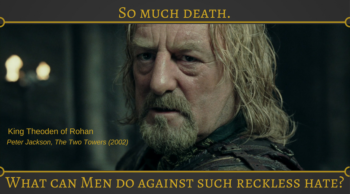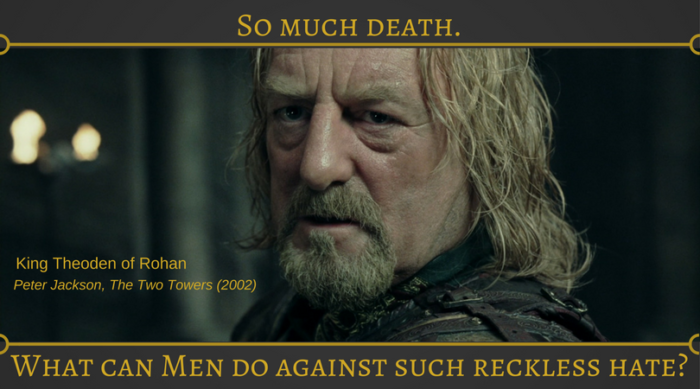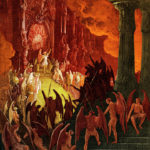What Tolkien Taught About Fighting Evil
We live in a world in which many of us feel evil is on the rise. Not everyone feels that way, which is interesting enough, but more interestingly, readers of Speculative Faith who are convinced rising evil is a problem likely don’t even agree on what the evil we are facing actually is. Do we face a dangerous rise in socialism, communism, fascism, cancel culture, racism, Critical Race Theory, too much herd mentality, too much individualism, neo-paganism, fundamentalism, feminism, or patriarchy? Or do we face a puzzling and disturbing mixture of all of the above?–just to name a few things people are often concerned about. Please note though that what we should care about most isn’t addressed by this post (though I’ll mention a particular reason some people are concerned). What this post does do is look at the writings of J.R.R. Tolkien, in the Lord of the Rings in particular, and extracts what this wise author of the past had to say about how we should be fighting evil. What should our methods be in our epic real-world struggle between good and evil? Does such a struggle even exist?
Is Fighting Evil Actually a Thing for Christians?
When you read the Bible from cover to cover, you can’t help but notice the Scriptures list both a good power–God (also Jehovah, etc.) and an evil power, Satan (the Devil, etc.). There are also epic struggles between human armies recorded at times. King Hezekiah and the Judeans surrounded by sinister Assyrians, who were struck down by the angel of God. Moses with arms upraised and the Israelites fighting the Amalekites. The Ammonite king Nahash (whose name meant “snake”) came up against Jabesh-Gilead, saying he would put out an eye of each man of the city and make them his slaves, only to be foiled by King Saul. The armies of heaven destroying the armies of the “Beast” at the end of Revelation. All direct examples of fighting evil.
So we do see evil and good in toe-to-toe battle on multiple occasions in the Bible, in a style as clear as the obviously-evil orcs besieging Helm’s Deep or Gondor.
An objection some Christians could raise to the idea of fighting evil is that Jesus called on us to love our enemies, not to fight them. We are not to overcome evil with evil, but rather overcome evil with good. But the simple answer to that objection is that the Bible clearly shows Christians fighting Evil, even if we refuse to kill enemies we perceive to be evil.
That’s because Bible has quite another story to tell about evil, other than fighting evil in physical combat: Moses losing his temper, Noah’s loss of self-control when drunk, Miriam’s arrogance against Moses, David’s adultery, Saul’s jealous rage, Solomon giving in to idol worship, Peter’s fearful denial, Thomas’s doubt. Evil not facing Good on a battlefield, where swinging swords will vanquish the enemy, but where Evil is in the heart of human beings and where it must be fought by choosing to submit to God. Perhaps the clearest example of this kind of struggle shows Jesus in the wilderness, not fighting the Devil with angelic or miraculous power, but rather fighting evil as in the temptation that Satan offered, the battle being over what Jesus would do and would say rather than physical combat.
Of course the Bible also includes some morally muddy figures like Sampson, who was good at killing Philistines but basically worthless otherwise. Or Lot, living in a wicked place, trying to protect angels, but willing to subject his daughters to abuse. Or Eli, who both tenderly cared for young Samuel, but also allowed his sons to profane serving God with sexual conquests and robbing from sacrifices. Or Pilate, discussing truth with Jesus, unwilling to condemn him, but for the sake of political expediency orders him put to death. Yet, in spite such figures, it’s clear the Bible overall shows a struggle between Good and Evil, even though that struggle doesn’t always involve physical combat, even though it’s sometimes hard to say with some people what side they are on.
Yet there are people, including some Christians, who deny that fighting evil represents a basic human reality.
Substituting Fighting Evil For a Model of Illness
The chief competitor to the idea that life includes Good and Evil and part of a good person’s duty is to fight evil is not Christian pacifism. Rather it’s a model of mental health. There is no Good or Evil in the ultimate sense in this view. There’s only sickness and wellness. Some people are mentally ill and need treatment. Others are functional but not necessarily “Good” with a capital G.
Such a worldview should produce a type of fuzzy moderation that’s unwilling to absolutely condemn anything. All can be good, all is morally relative. There are no actual villains or heroes in any absolute sense–there’s only people who are well or sick. Fighting evil is not necessary.
Note this type of attitude was very common in the Modernism of the Twentieth Century and still is with us, especially in stories in which no one is really good or bad, or better said, all have their own motivations and all justify themselves but nobody is actually truly moral or immoral, since morality is entirely subjective. J. R. R. Tolkien was quite concerned with this type of “morality,” all the rage in his day, as was C. S. Lewis.
Note though that this type of non-morality does carry with it some ideas we easily could call “moral” that holders of this view “fight” for, metaphorically speaking. Such as a strong belief in treatment for the mentally ill. A desire to cure rather than punish negative behavior. A feeling that science expressed in medicine will be able to make things better, if only we give science the opportunity. Science and medicine becomes de facto Good (yes, with a de facto capital G) and not providing treatment or seeing science as our “salvation” is Evil. Fighting evil amounts to fighting old ways of thinking, including the worldview of the Bible–though the term “Evil” mostly wouldn’t be used.
A third thing to notice about the mental health view of morality that tried but failed to eliminate the concept of ultimate good and evil was that it pretty much wiped itself out. Modernism led to post-modernism (though some Modernists are still lingering around), and Postmodernists, while they wholly embrace the notion of subjective truth, do not in fact embrace subjective morality. Critical Race Theory, and the Social Justice movement in general, is linked to postmodern thought and yet has very clear concepts about what is good and evil, leading people to fight with a fervor for what they believe as if there really is such a thing as fighting Evil with a capital E, even if they avoid that term (though Postmodernists sometimes actually use the word “Evil”).
So in spite of some people objecting to moralistic terminology, pretty much everyone believes in fighting evil. Even if we don’t agree what Evil is. So let’s return to what Tolkien said on this topic.
How Tolkien Showed Fighting Evil
Lesser Evil
You don’t have to be a scholar of English literature like my friend Anthony Cirilla to notice that with a few exceptions such as the balrog in Moria, the least dangerous villains in Tolkien’s fiction are those merely trying to kill the heroes. Orcs and trolls who smash and stab represent a real danger, a real evil that has to be fought, but the orcs and trolls are lesser-order baddies. They are not calling the shots from Mount Doom or Saruman’s tower. They are not the masterminds capable of destroying all of Middle Earth.
Greater Evil
The greatest evil in Lord of the Rings is the Ring itself. Its power to pull a person towards corruption is its greatest asset. Yet Sauron has the power to corrupt minions into his service without the one Ring, as he did with the nine riders, the Ringwraiths. The power to corrupt is part of what makes Sauron terrifying.
And the Ringwraiths call on Frodo to come with them to Mordor as well as try to slash him with swords. Yes, they are willing to kill him, but are also eager to turn him to their side.
The struggle between Gandalf and Saruman isn’t just a duel of magical power, it includes Gandalf’s appeal to the soul of Saruman, a protest of his decision to follow evil. Though that part of the struggle doesn’t last long, because Saruman is already committed to Evil.
Likewise the struggle Galadriel has within herself about whether to take the Ring doesn’t last long. She is too committed to Good. However, even though brief, this struggle is very important to the story.
Theoden and Boromir are in different ways captured by Evil–but they come back to help Good, both giving their lives to save others. Gollum is also called back from evil–but can’t quite return, though his fall back into wickedness served the purposes of those aligned against the powers of Evil.
Frodo as the ring-bearer is of course the clearest example of how fighting Evil really is more about fighting evil in yourself in Tolkien’s writings than smashing an enemy with a club or impaling him with a sword. Frodo’s struggle is the essential part of the Lord of the Rings quest. Unlike the film adaptation by Peter Jackson, the battles fought against orcs and other enemies in no way helps Frodo on his quest. He and he alone held the key to victory–and his struggle, apart from a few exceptional bits like the fight with Shelob, was internal. It was much more about whether or not Evil would control Frodo in the end than if he’d be killed.
Note that while Frodo did very briefly fall to the power of Evil, if he had done so any time sooner, the quest would have been over. Evil would have won.
If Boromir had not repented, if Theoden hadn’t come back, Evil might have won. There’s an important lesson here–good people turning bad does much harm. Winning them back does much good.
Also, people who should be good, who foolishly work against Good, such as Denethor, Steward of Gondor, or who work against Good because of being corrupted by Evil, such as Saruman, do much harm. It is vitally, vitally important to the quest to keep Evil from conquering everyone that good people don’t surrender themselves to personal darkness.
Tolkien made it clear that the greatest, most important way to fight evil is to make sure you don’t give yourself over to Evil.
Guard your own heart, as the Bible says in Philippians 2:12: “Work out your salvation in fear and trembling.” Don’t be arrogant about yourself and presume you are right. Check your own heart–guard yourself from Evil–resist temptation, as Jesus did. That’s the most important way to be fighting evil. Inside, not out.
Why I’m Bringing This Up–Conclusion
While the issue of what we can learn from Tolkien about fighting evil could be brought up at any time and applies to every person on the planet, it is true that I know Christian people in dismay over the current political situation in the United States. There’s a thought that political opponents will use their power to suppress dissent–that just as the former president of the United States lost access to a platform of communication, so could anyone who disagrees. Many have a sense that hard times are coming, beyond just the suppression of dissent.
So I’m writing this bit to remind everyone that your most important duty is not to remold the culture in your image or triumph in politics. Your most important duty is to resist Evil yourself. To be the Aragorn wandering in the wilderness if need be, separated from the halls of power but doing good nonetheless, waiting for the due time when providential circumstances will call you out of the forest (metaphorically speaking, of course–you don’t have to go live in a forest 🙂 ).
If you are allowed a Shire, enjoy it. But if not, you are not justified in setting up your own tower like Saruman, forcing others to follow your will through malicious power. Tolkien did show a need to fight those trying to do immediate physical harm to others. But that isn’t the greatest struggle between Good and Evil (nor did he show Shire people decide to execute a pre-emptive strike on Mordor).

Image copyright: New Line Cinema
One of the worst things you can do is to try to seize power for the supposed purpose of obtaining a good goal. The most important thing is to keep yourself from Evil and to work to win back the Theodens of the world–those under the control of the power of Evil. That’s the fight we need to be fighting. Not physical combat–the physical battle will ultimately be resolved by the armies of heaven, not you and I.
So, having said all of that, I don’t feel I’m in any danger of being mistaken for a scholar of Tolkien’s works. I think my observations were simple and straightforward and this was not the first time someone on Speculative Faith addressed the issue of evil in relation to Tolkien (Rebecca Miller did, more than once, and Anthony Cirilla had some very interesting observations about the Hobbit, though not specifically about Evil).
What do you think, reader, about what Tolkien’s fiction showed about fighting evil? Do you agree or disagree with my take on the Lord of the Rings? What other thoughts come to mind?












































Good read. I like the idea of the timing. If Frodo gave in too soon, the quest would have been over. That’s really cool because God redeems the time and knows that every second counts. So resisting evil and eventually falling, still shows grace if we repent and are open to the Spirit.
Excellently written, Travis! I enjoyed reading your thoughts on such combat.
Phew! What a fantastic article!
Interesting article. I do agree that some battles need to be physically fought. Extremist groups like ISIS can’t be reasoned with and sticking our heads in the sand won’t solve anything.
The biggest battles are indeed fought in our minds. Inside our very being. Tolkien showed us this in Frodo’s battle in resisting the pull of the ring.